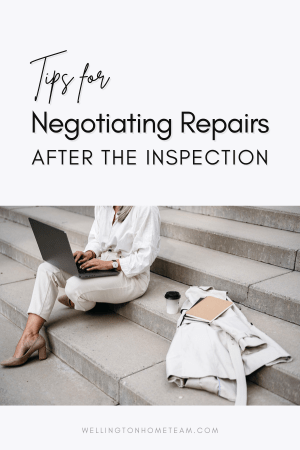15 Legitimate Repair Requests When Buying a Home
When buying a home it’s important to have a thorough home inspection to identify potential issues or needed repairs. While the perfect home doesn’t exist, even a newly constructed home, there can be legitimate repair requests that buyers can request the seller to address. Understanding what constitutes a legitimate repair request is crucial when going back and trying to negotiate with the seller. Let’s take a closer look at repair requests when buying a home.

The Importance of a Home Inspection
Before delving into legitimate repair requests, it’s important to discuss the significance of home inspections. A home inspection is a visual evaluation of a property that is conducted by a licensed home inspector. The purpose of a home inspection is to assess the overall condition of the property and identify any potential issues or defects.
A home inspector can uncover hidden problems that may not be visible to the untrained eye, such as structural issues, electrical or plumbing problems, or safety hazards. The inspection report will provide buyers with valuable information that can help them make informed decisions about the purchase, possibly negotiate repairs, and plan for future maintenance or renovations. Ultimately, a home inspection will help the buyer gain a comprehensive understanding of the property’s overall condition and what they’re buying.
Legitimate Repair Requests
It’s essential to differentiate between legitimate repair requests and those that may be considered excessive or unreasonable. Legitimate repair requests include structural issues, safety hazards, mechanical issues along with health hazards. Let’s take a look at some examples of legitimate repair requests and what a buyer can reasonably expect the seller to address before closing.
- Roof leaks
- Foundation issues
- Compromised load-bearing walls
- Plumbing issues
- Electrical issues
- Mold
- Water damage
- Sewage problems
- Pest and rodent infestations or damage
- Non-operational windows
- Lose handrailings
- Broken fencing
- HVAC issues
- Water heater issues
- Appliances in need of repair or replacement
It’s important to note that repair requests should be reasonable and necessary, and not cosmetic or minor in nature. Additionally, the specific terms of repairs will be spelled out in the contract. So prior to asking for legitimate repair requests refer to your contract. Is the seller required to make repairs or do they have the option to say no? Is there a cap on how much a seller has to spend on repairs or is it an open checkbook? Knowing this information will help better assist a buyer when determining what and if any repairs they should ask the seller to address.
What are Not Legitimate Repair Requests?
Items that are not considered legitimate repair requests are cosmetic items or issues that the buyer is already aware of. Trying to renegotiate after the home inspection for items or issues the buyer knew about usually doesn’t set the stage for a smooth transaction. In fact, sellers may be so annoyed they will be less than cooperative moving forward. Here are a few examples of non-legitimate repair requests.
Cosmetic Upgrades
Requests for purely cosmetic upgrades, such as repainting a room or replacing perfectly functional but outdated fixtures or appliances for aesthetic reasons.
 Normal Wear and Tear
Normal Wear and Tear
Requests to address minor issues that are considered normal wear and tear, such as small cracks in the driveway, worn carpeting, or a ding in the garage door.
Known Defects
Requests for repairs on issues that were already disclosed or known to the buyer at the time of making the offer, such as pre-existing water stains or existing termite damage that was, or at least should have been, factored into the negotiated price.
Personal Preferences
Requests to change or modify features that are based on personal preferences rather than structural or functional concerns, such as requesting to remove a perfectly functional built-in bookshelf or change out flooring.
Consequential Repairs
Requests for repairs related to issues that are considered normal consequences of aging or deferred maintenance, such as replacing a water heater or roof nearing the end of its useful life.
Setting Realistic Expectations
While understanding legitimate repair requests is crucial, it’s equally important to set realistic expectations when negotiating with the seller. It’s unlikely a seller will agree to repair every minor issue or cosmetic imperfection. Some issues just don’t warrant a request even some items that may be considered “legitimate.”
When making repair requests, focus on significant issues that impact the home’s livability, safety, or long-term value. Items that the next buyer would have an issue with as well. Buyers should also keep in mind that excessive repair requests may alienate the seller and jeopardize the overall transaction. Prioritize the most critical repairs and negotiate for appropriate repairs or repair credit.
Tips for Negotiating Repairs After the Inspection
Negotiating repairs after a home inspection can be challenging but here are some top tips to help navigate the process:
Prioritize
Focus on the most significant issues that impact the safety, functionality, or value of the property. Identify and prioritize the repairs that are essential and need to be addressed immediately.
Be Specific
Clearly articulate the requested repairs in writing, providing detailed descriptions, supporting documentation, and photographs from the inspection report. This helps ensure that both parties have a clear understanding of the necessary repairs.
 Obtain Multiple Quotes
Obtain Multiple Quotes
If the repairs require professional services, consider obtaining multiple quotes from qualified contractors. This will help educate the seller about a realistic cost to make repairs.
Seek Professional Advice
Make sure to consult with your real estate agent, they will be able to offer guidance and negotiate on your behalf. They have experience in navigating repair negotiations and can help advocate for your best interests.
Be Open to Solutions
Consider alternative options or solutions that could address the issues at hand. For instance, negotiating a credit towards the closing costs instead of requiring the seller to make specific repairs.
Communicate Effectively
Maintain open and respectful communication during the negotiation process. Clearly express your concerns, provide supporting evidence, and be open to constructive dialogue to reach a mutually beneficial resolution. Remember, the goal of repair negotiations is to ensure that the necessary repairs are addressed in a fair and satisfactory manner.
Final Thoughts
Understanding the distinction between a legitimate repair request and a non-legitimate one is crucial when buying a home. Legitimate repair requests focus on significant issues that impact the safety, structural integrity, or livability of the property. These requests are reasonable and necessary for the buyer’s peace of mind and the overall condition of the home.
On the other hand, non-legitimate repair requests typically involve cosmetic or minor issues that are part of normal wear and tear or personal preferences. By being knowledgeable about what constitutes legitimate repair requests, buyers can be much more successful with any of their requests.
Please consider spreading the word and sharing; 15 Legitimate Repair Requests When Buying a Home
Understanding what constitutes a legitimate repair request is crucial when trying to negotiate with the seller after a home inspection. Let's take a closer look at legitimate requests. #realestatePopular Repair Request Questions
Who verifies repairs after home inspection? After a home inspection, it is the responsibility of the buyer to verify that the requested repairs have been completed to their satisfaction. While some buyers will accept repair receipts from the seller as confirmation the repairs were completed and call it a day, that is not advisable. Buyers should see firsthand that the repairs were properly completed. In some cases, having the home inspector come out to reinspect may be the best option especially if the repairs were major.
How long does seller have to respond to repair request? The length of time a seller has to respond to a repair request will depend on the contract. In some cases, there may be specific timelines outlined in the contract, dictating when the seller has to respond. However, if there are no specific timelines mentioned, it is generally considered reasonable to expect a response within a few days. It is essential for buyers and sellers to communicate and work together in good faith to reach an agreement within a reasonable timeframe.
Can seller walk away after inspection? In general, the ability of a seller to walk away after the inspection depends on the terms and conditions outlined in the contract. However, unless specifically stated a seller usually cannot cancel the contract, but in some cases the buyer can.
Seller not willing to negotiate after inspection, now what? If the seller is unwilling to negotiate after the inspection, there are a few options for the buyer to consider. One option, they can proceed with the purchase as-is, accepting the property’s condition and assuming the responsibility for any necessary repairs or maintenance.
Alternatively, if the contract allows the buyer can cancel the contract and walk away. It’s crucial for the buyer to consult with their real estate agent to fully understand their rights and options in this situation.
About the Author
Top Wellington Realtor, Michelle Gibson, wrote: “15 Legitimate Repair Requests When Buying a Home”
Michelle has been specializing in residential real estate since 2001 throughout Wellington Florida and the surrounding area. Whether you’re looking to buy, sell or rent she will guide you through the entire real estate transaction. If you’re ready to put Michelle’s knowledge and expertise to work for you call or e-mail her today.
Areas of service include Wellington, Lake Worth, Royal Palm Beach, Boynton Beach, West Palm Beach, Loxahatchee, Greenacres, and more.
15 Legitimate Repair Requests When Buying a Home

 Michelle Gibson of the Hansen Real Estate Group Inc is a full-time REALTOR who has been specializing in Wellington Florida real estate since 2001. This veteran of the real estate industry has expertise in technology, marketing, and social media.
Michelle Gibson of the Hansen Real Estate Group Inc is a full-time REALTOR who has been specializing in Wellington Florida real estate since 2001. This veteran of the real estate industry has expertise in technology, marketing, and social media.